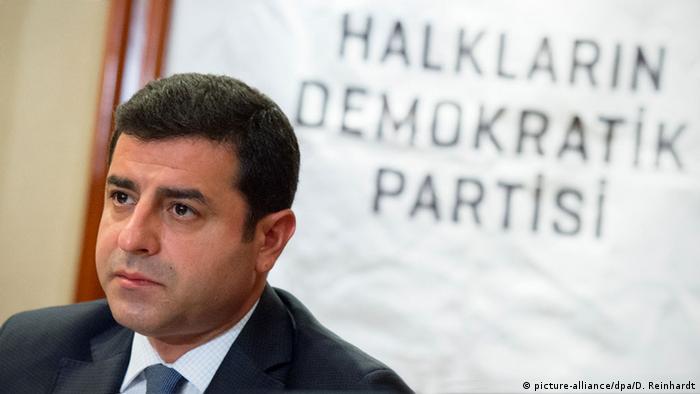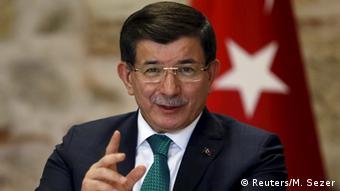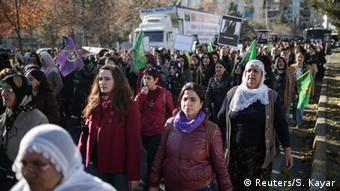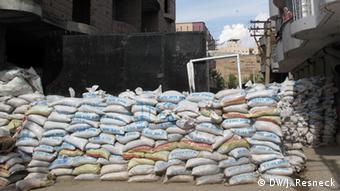TURKEY
Turkey opens investigation into top Kurdish politician as violence escalates
Turkey's prime minister has refused to include Kurds in talks for a new constitution amid a dangerous uptick in violence in the country. A prosecutor has opened an investigation into the country's top Kurdish politician.
Turkish prosecutors on Monday opened an investigation into the country's top Kurdish politician over a statement on "autonomy," a day after a group of Kurdish political groups set out a framework for self-rule.
The investigation against Selahattin Demirtas (pictured), the co-chair of the pro-Kurdish People's Democratic Party (HDP), comes amid a serious breakdown in political talks with the ruling Justice and Development (AK) Party government and a spiral of violence between Kurdish militants and security forces that has pushed the country closer to the edge of civil war.
Demirtas has immunity from prosecution that could be stripped only by parliament, but a sentence could still be imposed for a time he no longer has immunity.
On Sunday, a congress of Kurdish groups that includes the HDP issued a 14-point declaration for self-rule and decentralization as a new democratic project to address what it described as the failed model of the Turkish state.
"Today we are facing the problems caused by the failure to come up with a democratic and political resolution to the Kurdish question," the declaration stated.
The Kurdish people have struggled for legal and political status that "is predicated on a sense of democratic politics and governance, co-existence and achievement of a democratic resolution to the Kurdish question on the basis of political status," the declaration added.
Government excludes Kurds from constitution talks
Turkish Prime Minister Ahmet Davutoglu on Monday said he would not include the HDP, the third-largest party in parliament, in meetings scheduled for this week with other parties to lay the ground for talks aimed drawing up a new constitution for Turkey because of the "disrespectful" attitude of its leadership.
"I can discuss the constitution with anyone, but the unity of Turkey is not a matter of discussion," Davutoglu said.
Last week, the prime minister accused Demirtas of "treason" after the Kurdish leader visited Moscow a month after Turkey shot down a Russia jet on the Syrian border.
Previous attempts to draw up a new constitution to replace the one written up by the military following a 1980 coup have floundered.
AK Party founder and current President Recep Tayyip Erdogan wants the new constitution to create a US-style presidential system that critics argue would grant his authoritarian government enhanced powers.
The main opposition Republican Peoples' Party (CHP), ultra-nationalist MHP (Nationalist Movement Party), and the HDP are all against the presidential system. The AK Party would need the support of other parties to change the constitution either through a two-thirds vote in parliament or 60 percent vote followed by a referendum.
Turkey's 15 to 20 million Kurds want the constitution to recognize their identity and language and decentralize the highly centralized state. They have long dropped demands for independence and instead want to work within a democratic Turkey.
Spiral of violence
The breakdown of a two year ceasefire and peace talks between the state and banned Kurdistan Workers' Party (PKK) in July, followed by a spiral of violence that has claimed the lives of hundreds of security forces, militants and civilians since the summer, has hardened the position of both sides of the conflict.
The PKK has traditionally operated in rural areas and the mountains, but since July the group's urban youth wing, the YDG-H, over which it has questionable control, declared "autonomous administration" in several towns. Armed Kurdish groups have also set up so-called "self-defense" forces.
In response, several Kurdish towns and districts in southeastern Turkey - including Cizre, Silopi, Nusaybin, Dargecit and Diyarbakir's Sur district - have been under weeks of 24-hour, open-ended curfews as the military carries out operations against the PKK-affiliated militants who have built barricades and trenches to keep security forces out.
The government has vowed to root out every last "terrorist" from Turkish soil and accused Kurdish politicians of provoking the violence.
In turn, Kurdish political groups including that of Demirtas have defended the declaration of local autonomy and self-defense as a response to collapsed peace talks and the rejection of demands for legal and political status. The Turkish government accuses the HDP of being the legal arm of the PKK, a charge the HDP denies.
More than 1 million people have been impacted by the curfews and at least 100,000 people have fled as electricity and water has been cut. The curfews have prompted widespread protests against the government and security forces, which have fired water canon, tear gas and even live bullets at those violating the curfews.
According to the Human Rights Foundation of Turkey, since mid-August there have been 56 open-ended curfews and at least 124 civilians have been killed, including women and children.
The PKK is recognized as a terror organization by the European Union, the United States and Turkey. At least 40,000 people have been killed and hundreds of thousands displaced in nearly three decades of fighting.
cw/se (AFP, Reuters)





No comments:
Post a Comment